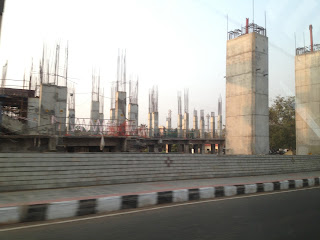You cannot travel to China or India (or most other places in the world) without feeling the frenetic pace of economic growth combined with globalization. Mumbai, Chennai, Bangalore, and Delhi -- my Indian stops on this trip -- are perfect examples. These cities are undergoing remarkable amounts of construction. Cranes dot the skyline. Billboards tout brilliant apartment complexes. The streets near airports are like tiny dens existing under the shadows of new highway systems under construction. Chennai is in the midst of expanding its already significant light rail system along the coast to a city-wide transit network. Cities are exploding with continued rural migration to the cities. Mumbai -- a colossal agglomeration of 21 million -- is set to become the world's largest metropolitan area.
All of this constitutes something that we sometimes call "progress" as millions of human beings flock to cities, (perhaps) find greater opportunities, (perhaps) rise into the middle class, and (perhaps) pursue economic possibilities. This massive urbanization of India (and many other places, especially China) is one of the greatest, if not the greatest, migration of human beings in history. This migration is quite literally changing our world. Tens of millions of new cars flood the streets of Indian cities. Energy and water demands rise as standards of living of the wealthy and middle classes rise. The food needs of massive cities continue to grow. Instability breeds as some find that life in urban slums is not what they had bargained for. In many ways, the shape of our world is being set in these Asian mega-cities.
It is easy to lose the humanity amidst the numbers. Yet it is a deeply human story. Some of the stories are indeed stories of success -- of poor, rural families finding new possibilities in cities and moving, by way of slums and later more settled communities into productive urban life. I've met many people like that whose grandparents or great-grandparents labored in subsistence farming with life or death at times depending on the timing of the monsoons. Yet there are many other stories too. I'm told that the construction of the new metro system in Chennai has brought in 35,000 workers from the poor eastern states of Orissa and Bihar. For some, this is a great opportunity, but for many at the lowest levels, I am told, it is a life of bonded labor that is exploitative and nearly impossible to escape. Thousands more end up in bonded labor as prostitutes. "Progress" truly takes a toll.
These issues are not unique to India or to Asia. There are in many ways parallels to some aspects of life in the west. Many of these issues have existed for centuries. But the remarkable thing here is the scale and the speed of change. The number of Indians under 14 - 189 million - is 35% of the Indian population (compared to 20% in the US, which is also a young country). These massive urban centers - with their progress and their problems -- will continue to shape our global life, for good and for bad, for decades to come.


No comments:
Post a Comment